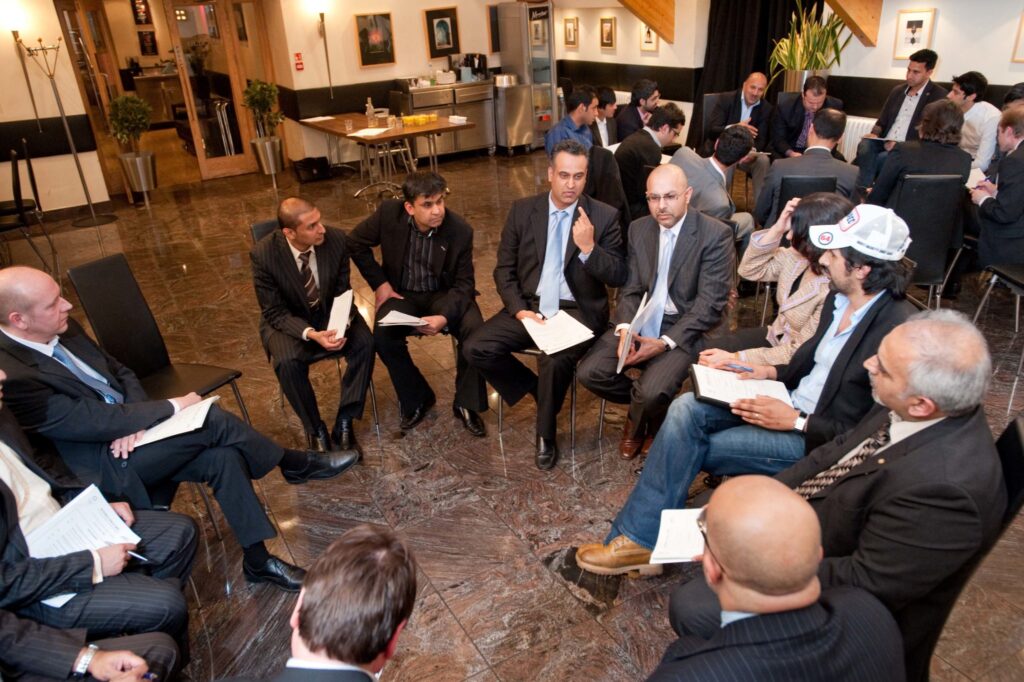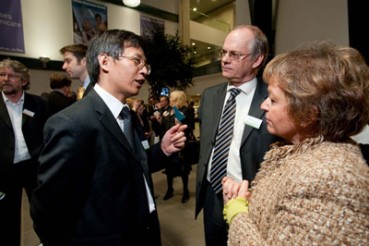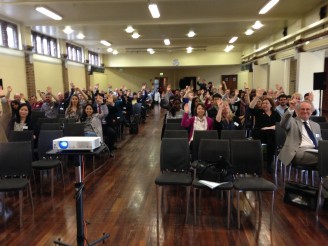How to plan a successful business event
5 September 2014 By Northern Lights

The arrival of September means many things. The end of summer, a new school term, increasingly congested roads and the countdown to Christmas. However, in the business world it marks a return to activity after a holiday-induced lull in activity and also, the start of the events season.
 Business events continue to grow in popularity and the run-in to Christmas sees a sharp upturn in acitivity. Indeed, if you plan carefully, a savvy business owner can ensure they won’t have to cook until Christmas day by joining the wealth of breakfast debates, networking lunches and award dinners (you’ll have all seen the well-fed frequent flyers at these events).
Business events continue to grow in popularity and the run-in to Christmas sees a sharp upturn in acitivity. Indeed, if you plan carefully, a savvy business owner can ensure they won’t have to cook until Christmas day by joining the wealth of breakfast debates, networking lunches and award dinners (you’ll have all seen the well-fed frequent flyers at these events).
But, business events go way beyond food. In addition to providing excellent networking, for event organisers, they are a fantastic tool for promoting your business, bolstering relationships with existing clients, developing contacts with top targets, seeking feedback on your own business and, most importantly, identifying future opportunities.
I’ve written in the past about how to make the most of networking, and here thought I’d share my thoughts on how to stage a successful event and maximise the benefits.
I’ve organised, hosted and attended hundreds of business events over the years – the good, the bad and the truly awful – and believe successful events come down to four key elements. They are: having a clear goal; having engaging content; having quality guests; and creating conversations.
How do I organise a business event?
With all business events, starting out with a clear goal is paramount. Ask yourself what you want to achieve from an event? Is it to promote your business, demonstrate your expertise through research or insights, target new business or new sectors, strengthen relationships with existing clients, seek feedback on your business or identify new trends and opportunities?
The goal is what will define your event. I’ve been to too many events where it was staged just because “we always stage an event in September” or “we felt we should stage an event because everyone else does”. These events always lack focus and always fail to attract the people you want and fail to deliver on the day.
 By setting out a clear goal you can shape every element of the event to meet that goal. It defines what type of event you need – anything from a small round table debate with 10-20 people or an intimate lunch with 3 or 4 individuals to major debates, talks and award nights with 100+ people.
By setting out a clear goal you can shape every element of the event to meet that goal. It defines what type of event you need – anything from a small round table debate with 10-20 people or an intimate lunch with 3 or 4 individuals to major debates, talks and award nights with 100+ people.
It also defines what you need to include, whether that be keynote speakers, market analysis or even a comedian, and, most importantly, it defines who you need to invite.
By delivering the type of event, content and people you need to achieve your goals, only then can you expect your team to make the most of the event by using it to develop new business – which is the ultimate goal of every event.
What should I include in my business event?
Content is key in everything and that’s especially important for an event. With hundreds of events to choose from in the coming months, your event will need a strong hook to ensure you get the people you want to attend.
The easiest way to do that is by making sure your event features a compelling discussion, speech or debate. All too often I attend events where it’s a quick welcome from the business leader followed by a “this is what we’ve done so far”. While close friends of the firm will turn out for these, it’s not necessarily going to attract those new clients you are chasing.
Similarly, I see a lot of events that have really great speakers, but then they are just asked to trot out the same “this is my life” story. Once again, all of that information is already available and has probably been heard at 50 events before.
What most people want from an event are opinions and insights. They attend events to hear how others overcome challenges, how they identify new opportunities and what the next big thing may be. Most importantly, they want to learn how others win business and how they secure success.
 That can be achieved in a number of ways. I’d always say you should have a good portion of time for your audience to ask questions and make sure you have a strong and interesting host who can ask the tough questions and encourage others to do the same.
That can be achieved in a number of ways. I’d always say you should have a good portion of time for your audience to ask questions and make sure you have a strong and interesting host who can ask the tough questions and encourage others to do the same.
Go back to your goals and look at what needs to be achieved and then invite the person or group of people you need to fuel the debate, share insights and deliver the outcomes you need.
Who should I invite to my business event?
As I’ve said, business events should be about bolstering existing client relationships and also developing relationships with potential new clients. Again, refer back to your goals and see who needs to be there to help you fulfil them. For insights on how to get people to the event, click here.
I’d always make sure you have a few existing clients who can be evangelical about your products or services, but I’d also look to include those who may be stout followers of your competition. It’s often these people who can offer the best insights into your own business and help refine your strategy.
Most importantly, make sure your team has clear goals for the people they need to speak to and also the conversations they should be looking to facilitate with guests. If you can ensure everyone who attends comes away with some quality insights and connections, you’ll guarantee that your relationship with them will grow.
Your team needs to understand who they are speaking to and also make sure they lay the groundwork for follow-up meetings and calls if necessary. Everyone should have set targets, whether that be to help strengthen existing relationships or try and formulate new ones.
This is the key way you will extract value from the event so, if you’re looking for insights and opportunities, make sure the right questions are being asked. If you’re seeking new business, make sure the expertise you need is in the room should any crucial questions arise.
By planning your guest list carefully, doing your research and making sure everyone has clear targets, you can quickly see solid returns from this relatively inexpensive form of marketing.
How do I build conversation around my business event?
Today, the most successful business events see conversations begin way in advance of the event itself and then continue in the days that follow. Much of this is facilitated by social media and if you look at some of the major business events, you’ll see that people can start discussing it months in advance.
 By starting the conversation in advance – consider email bulletins and surveys, LinkedIn or Google+ communities or by using a Twitter #hashtag – you help to build noise and excitement and you also help to provide introductions and encourage people to meet at the event.
By starting the conversation in advance – consider email bulletins and surveys, LinkedIn or Google+ communities or by using a Twitter #hashtag – you help to build noise and excitement and you also help to provide introductions and encourage people to meet at the event.
By providing the facility for the conversation to continue after the event, you create the opportunity to continue to promote your business, demonstrate your expertise and build those formative new business relationships.
By contacting those target guests in advance, you also help to shape the event and begin the first tentative steps to creating new opportunities. Consider email surveys around the key issues your aiming to address or, if it’s a debate, speak to them about the issue to help find key questions or consider whether you need more expert opinions.
Every person that is attending your event is coming for the conversation. If you can extend that conversation, you only help to increase your chances of winning new business.
Events are on the up and are becoming big business in their own right. If they’re carefully planned and managed, the benefits can be significant. If they are cobbled together, they will fail and the damage to your brand can be long-lasting.
I’d welcome your thoughts on how you plan events and if you’d like any further advice and guidance or even support for your event, contact me at ben@northernlightspr.com
